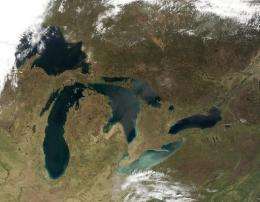MODIS (Moderate Resolution Imaging Spectroradiometer) image obtained from NASA shows the Great Lakes (L-R) Superior, Michigan, Huron, Erie, and Ontario. Zebra mussels from the Caspian Sea, introduced to North America by accident, are becoming a veritable plague releasing toxic chemicals into the Great Lakes, Canadian biologists say.
Zebra mussels from the Caspian Sea, introduced to North America by accident, are becoming a veritable plague releasing toxic chemicals into the Great Lakes, Canadian biologists say.
The mussels hitch-hiked to Canada on the ballasts of cargo ships arriving on the continent in 1986. And in the past two decades the thumbnail-sized creatures have spread and are found in more than a third of the Great Lakes.
Not content with devouring plankton and indigenous species, the mussels are sucking on toxic polychlorinated biphenyls (PCBs) trapped in the lakes' sediment and releasing the chemicals into the freshwaters, Todd French, a biologist at Queens University in Kingston, Ontario told AFP.
"Zebra mussels act as a siphon. They absorb everything and reject what is toxic," he explained.
PCBs were first manufactured in 1929, and were widely used in sealing and caulking compounds, cutting oils, inks and paint additives.
They were detected in the Great Lakes for the first time in 1966. By 1977, concern over the environmental impact of PCBs, which do not break down easily, led to a North American ban on manufacturing and importing the chemicals.
Levels in the Great Lakes abated until the late 1980s before starting to climb again, because of the mussels, scientists have now discovered. Their findings were published in a recent issue of the journal Ecosystems.
The concern is the mussels are releasing PCBs that had been trapped in sediment for decades in waters where they are then absorbed by algae and other animals up the food chain until they eventually reach fish eaten by humans.
Health Canada says small amounts of PCBs are unlikely to cause adverse health effects. But an accumulation of the chemicals in the body can lead to problems of the nervous system, and liver and kidney cancer.
"There is a concern for the 40 million people (Canadians and Americans) living near the Great Lakes," French said.
Lakes Superior, Michigan, Huron, Erie, and Ontario form the largest group of freshwater lakes in the world with a total surface of is 208,610 square kilometers, and hold 21 percent of its fresh water.
"Eventually, we'll have to re-evaluate guidelines for the consumption of fish from the Great Lakes," French urged.
Over the long term, PCB levels in the Great Lakes should eventually stabilize since the chemicals have largely been phased out, but the havoc created by the mussels does not end there.
They blanket vast areas in clusters, interfering with and even suffocating indigenous mollusks and crustaceans, and cause billions of dollars in infrastructure damage.
"The zebra mussel gets into the cooling systems of power plants and clogs the pipes. It damages water treatment plants and aquaculture, and even boat engines," said Renata Claudi, head of a group fighting the mussels' spread.
"There is a product (Zequanox) which is (effective for destroying populations of) mussels, but it can only be used for eradication in small bodies of water," she said. The Great Lakes are far too big.
"There is nothing really that we can do to stop them," concluded Chris Grooms of the ecological group Kingston Field Naturalists.
"We're just trying to stem their advance by cleaning boat keels to avoid further contamination of more lakes."
(c) 2011 AFP





















